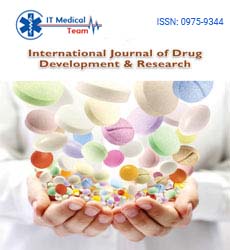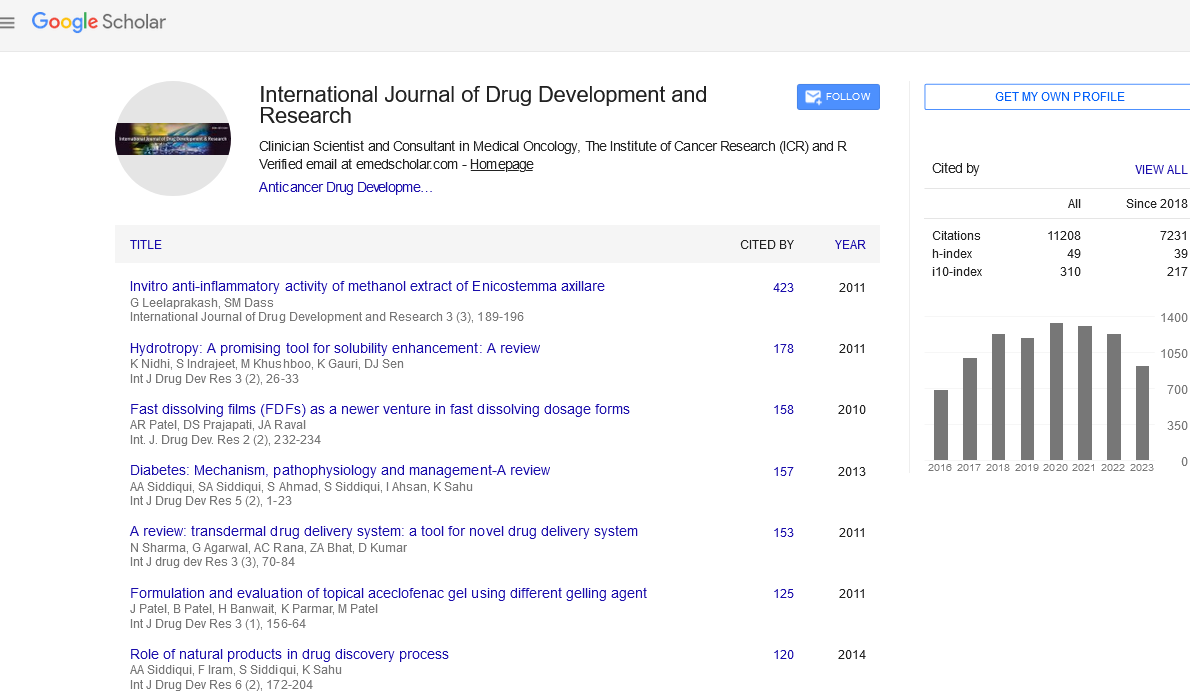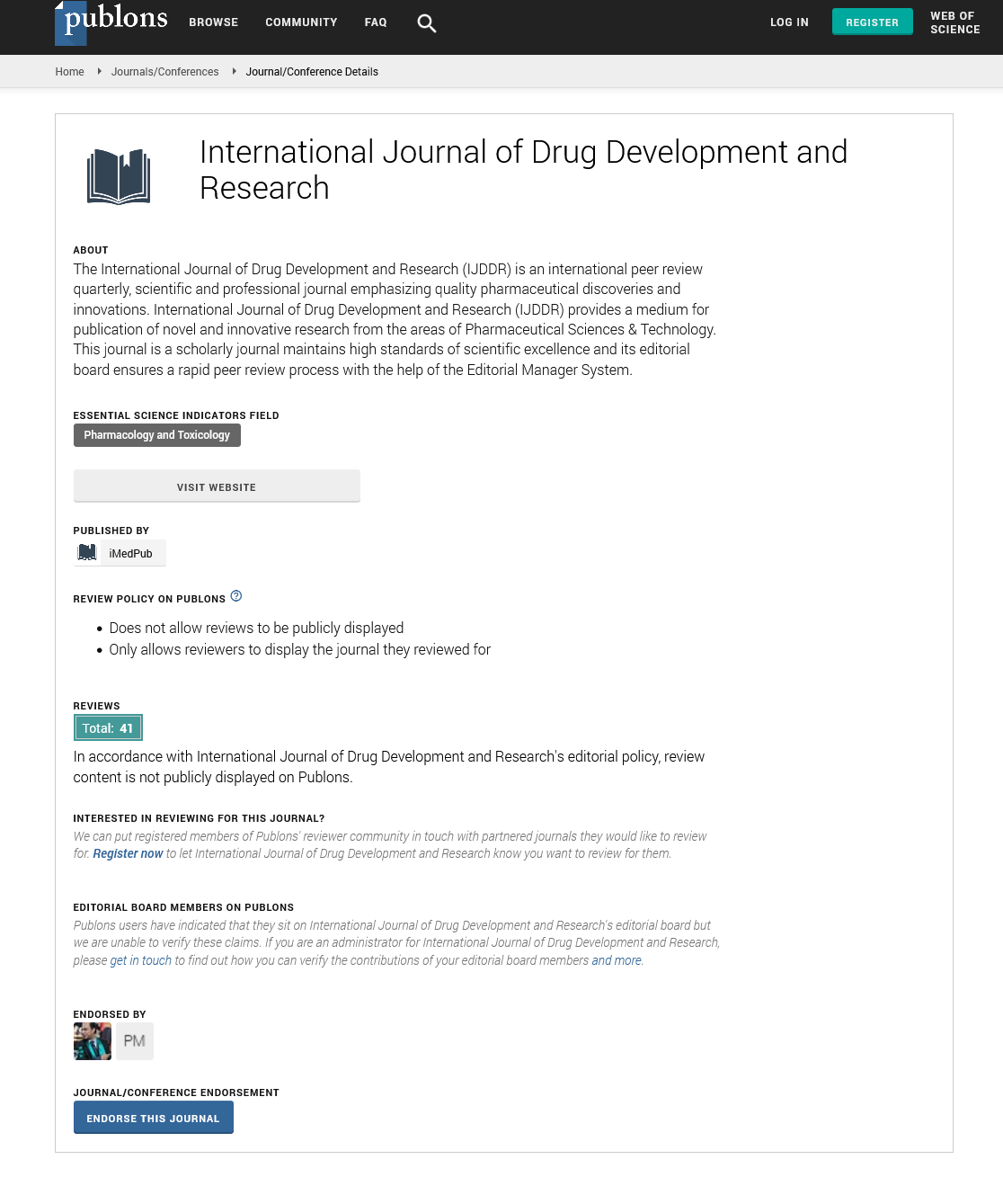Perspective - (2024) Volume 16, Issue 3
Personalized Medicine: Revolutionizing Healthcare Through Tailored Treatment
Hariom Rajput*
Department of Pharmacy Practice, University of Hyderabad, Hyderabad, India
*Correspondence:
Hariom Rajput, Department of Pharmacy Practice, University of Hyderabad, Hyderabad,
India,
Email:
Received: 09-May-2024, Manuscript No. IJDDR-24-14793;
Editor assigned: 13-May-2024, Pre QC No. IJDDR-24-14793 (PQ);
Reviewed: 27-May-2024, QC No. IJDDR-24-14793;
Revised: 03-Jun-2024, Manuscript No. IJDDR-24-14793 (R);
Published:
11-Jun-2024
Introduction
In the realm of healthcare, one size does not fit all. Each
individual is unique, with distinct genetic makeup, physiological
characteristics, and environmental influences. Recognizing this
diversity, personalized medicine has emerged as a paradigm shift
in healthcare, aiming to tailor medical treatments and
interventions to the specific needs of individual patients. This
article explores the concept of personalized medicine, its
applications across various medical disciplines, and the
transformative impact it is having on patient care and clinical
outcomes.
Description
Understanding personalized medicine
Personalized medicine, also known as precision medicine or
individualized medicine, is a healthcare approach that considers
individual variability in genes, environment, and lifestyle factors
when designing treatment strategies. At the core of personalized
medicine is the recognition that each patient may respond
differently to a given treatment based on their unique genetic
makeup, molecular profile, and clinical characteristics.
Advances in genomics, molecular biology, and bioinformatics
have paved the way for personalized medicine by enabling the
identification of genetic variants, biomarkers, and molecular
signatures associated with disease susceptibility, progression,
and response to treatment. By integrating this wealth of
biological information with clinical data and patient preferences,
healthcare providers can tailor medical interventions to optimize
efficacy, minimize adverse effects, and improve patient
outcomes.
Applications of personalized medicine
Personalized medicine has applications across a wide range of
medical disciplines, from oncology and cardiology to neurology
and infectious diseases. In oncology, for example, molecular
profiling of tumors allows clinicians to identify specific genetic
mutations or biomarkers that drive cancer growth and metastasis.
Armed with this information, oncologists can prescribe targeted
therapies or immunotherapies that selectively inhibit cancer cells
while sparing healthy tissues, leading to more effective and less
toxic treatment regimens.
Similarly, in cardiology, genetic testing can help identify
individuals at increased risk of cardiovascular diseases or
adverse drug reactions due to genetic predispositions. By
incorporating genetic information into risk assessment models,
cardiologists can tailor preventive strategies, such as lifestyle
modifications or pharmacological interventions, to address
individual risk factors and optimize cardiovascular health.
In infectious diseases, personalized medicine holds promise
for guiding the selection of antimicrobial therapies and
optimizing treatment regimens based on the genetic
characteristics of pathogens and host immune responses. By
identifying drug-resistant strains or genetic determinants of
treatment response, infectious disease specialists can prescribe
targeted antimicrobial agents or immunomodulatory therapies
that are tailored to the specific infectious agent and patient
profile.
Transformative impact on patient care
The adoption of personalized medicine is transforming the
landscape of patient care by shifting the focus from a one-size-fits-all approach to a more individualized and proactive model of
healthcare. By harnessing the power of molecular diagnostics,
genetic testing, and predictive analytics, personalized medicine
enables healthcare providers to deliver treatments that are
precisely tailored to each patient's unique biology, preferences,
and clinical needs.
One of the key benefits of personalized medicine is its
potential to improve clinical outcomes and patient satisfaction.
By matching treatments to the underlying molecular drivers of
disease, personalized medicine can enhance treatment efficacy,
reduce adverse effects, and prolong survival for patients with
cancer, cardiovascular diseases, neurological disorders, and
other conditions.
Moreover, personalized medicine empowers patients to take
an active role in their healthcare decisions by providing them
with personalized risk assessments, treatment options, and
prognostic information. By engaging patients in shared decision-making processes, healthcare providers can enhance patient
understanding, adherence, and satisfaction, leading to better
treatment outcomes and quality of life.
Challenges and future directions
Despite its promise, personalized medicine also faces several
challenges and limitations that must be addressed to realize its
full potential. One of the key challenges is the integration of
genetic and molecular data into clinical practice in a meaningful
and actionable way. Healthcare providers require access to
robust bioinformatics tools, electronic health records, and
decision support systems to interpret genetic test results, make
informed treatment decisions, and communicate effectively with
patients.
Moreover, the cost and accessibility of genetic testing
and molecular diagnostics remain barriers to widespread
adoption of personalized medicine, particularly in resource-limited settings. Efforts are needed to reduce the cost of genetic
testing, improve reimbursement policies, and expand access
to personalized medicine technologies to ensure equitable
distribution of benefits across diverse patient populations.
Furthermore, ethical, legal, and social implications of personalized
medicine, such as privacy concerns, data security, and potential
for discrimination, require careful consideration and regulation to
protect patient rights and ensure responsible use of genetic
information.
Conclusion
Personalized medicine represents a transformative approach
to healthcare that holds the promise of revolutionizing patient
care and clinical outcomes. By harnessing the power of
genomics, molecular diagnostics, and predictive analytics,
personalized medicine enables healthcare providers to deliver
treatments that are tailored to each patient's unique biology,
preferences, and clinical needs.
As personalized medicine continues to evolve, it is essential to
address the technical, ethical, and policy challenges that
accompany its implementation. By fostering collaboration
between researchers, clinicians, policymakers, and patients, we
can overcome these challenges and unlock the full potential of
personalized medicine to improve health outcomes and advance
the science of medicine for generations to come.
Citation: Rajput H (2024) Personalized Medicine: Revolutionizing Healthcare through Tailored Treatment. Int J Drug Dev Res Vol:16 No:3






